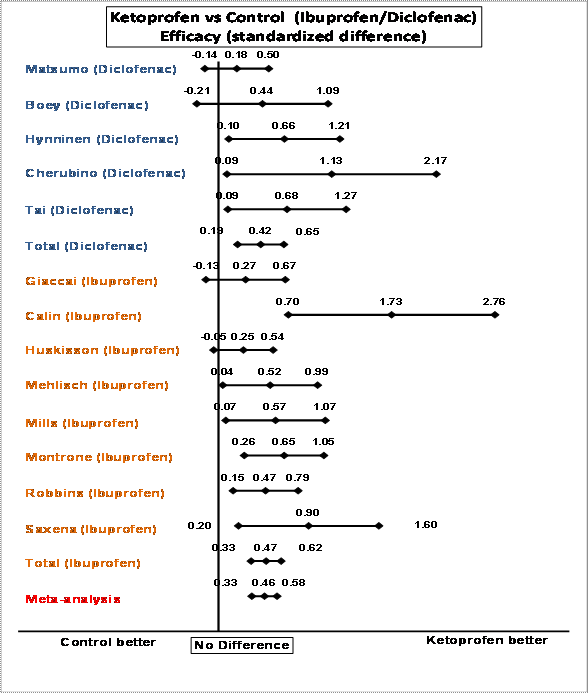Session Information
Session Type: Abstract Submissions (ACR)
Background/Purpose : The management of mild-to-moderate pain has traditionally been based on the use of non-steroidal anti-inflammatory drugs (NSAIDs) and the synthetic non-opioid analgesic paracetamol (acetaminophen), both of which are effective, widely recommended, and extensively used. Among the NSAIDs, ketoprofen, ibuprofen and diclofenac have been used for the last 30 years. The published placebo-controlled randomised clinical trials (RCTs) do not allow direct comparisons of the various NSAIDs, but meta-analyses can be used to make indirect comparisons that can demonstrate similar (but not identical) drug efficacy.
The aim of this systematic review of the literature and meta-analysis of randomised controlled trials (RCTs) was to compare the efficacy of orally administered ketoprofen vs ibuprofen and/or diclofenac.
Methods: The literature was systematically reviewed and search was restricted to randomised clinical trials comparing the efficacy of oral ketoprofen (50-200 mg/day) vs ibuprofen (600-1800 mg/day) or diclofenac (75-150 mg/day) published until June 2011 in the Medline, Cochrane Central and Embase databases. The study selection was made independently by two rheumatologists in accordance with the Cochrane Collaboration guidelines.
Results: A total of 13 RCTs involving 898 patients met the inclusion criteria: eight ketoprofen vs ibuprofen and five comparing ketoprofen vs diclofenac. Nine of the 13 RCTs included 544 patients with systemic rheumatic diseases such as RA, OA, ankylosing spondylitis (AS), low back pain or painful shoulder. The difference in efficacy between ketoprofen and ibuprofen/diclofenac was statistically significant (0.459, 95% CI 0.33-0.58; P=0.00) at all point-estimates of the mean weighted size effect (Fig 1). The test of heterogeneity for the efficacy outcome was not statistically significant (c2 = 18.07 – df= 12 – P = 0.1136). Concerning the estimated efficacy outcomes, ketoprofen was superior to ibuprofen/diclofenac in all of the 13 RCTs, reaching a statistically significant difference (P < 0.05) in nine studies. The heterogeneity for the efficacy outcome was not different across the studies and this guaratees that the compared trials are homogeneous and the meta-analysis results reliable and valid. The meta-analysis showed that the effect of therapeutic doses of ketoprofen was strongly greater than the effect of therapeutic doses of ibuprofen or diclofenac.
Figure 1: the size effect of ketoprofen and ibuprofen/diclofenac.
Conclusion : Findings of this meta-analysis support strong recommendation that the efficacy of orally administered ketoprofen in relieving moderate-severe rheumatic pain and in improving functional status and general conditions is significantly better than that of diclofenac/ibuprofen.
Disclosure:
F. Atzeni,
None;
P. C. Sarzi-Puttini,
Dompé SpA,
5;
L. Lanata,
Dompé SpA,
3;
M. Bagnasco,
Dompé SpA,
3.
« Back to 2012 ACR/ARHP Annual Meeting
ACR Meeting Abstracts - https://acrabstracts.org/abstract/efficacy-of-ketoprofen-vs-ibuprofen-and-diclofenac-a-systematic-review-of-the-literature-and-meta-analysis/

